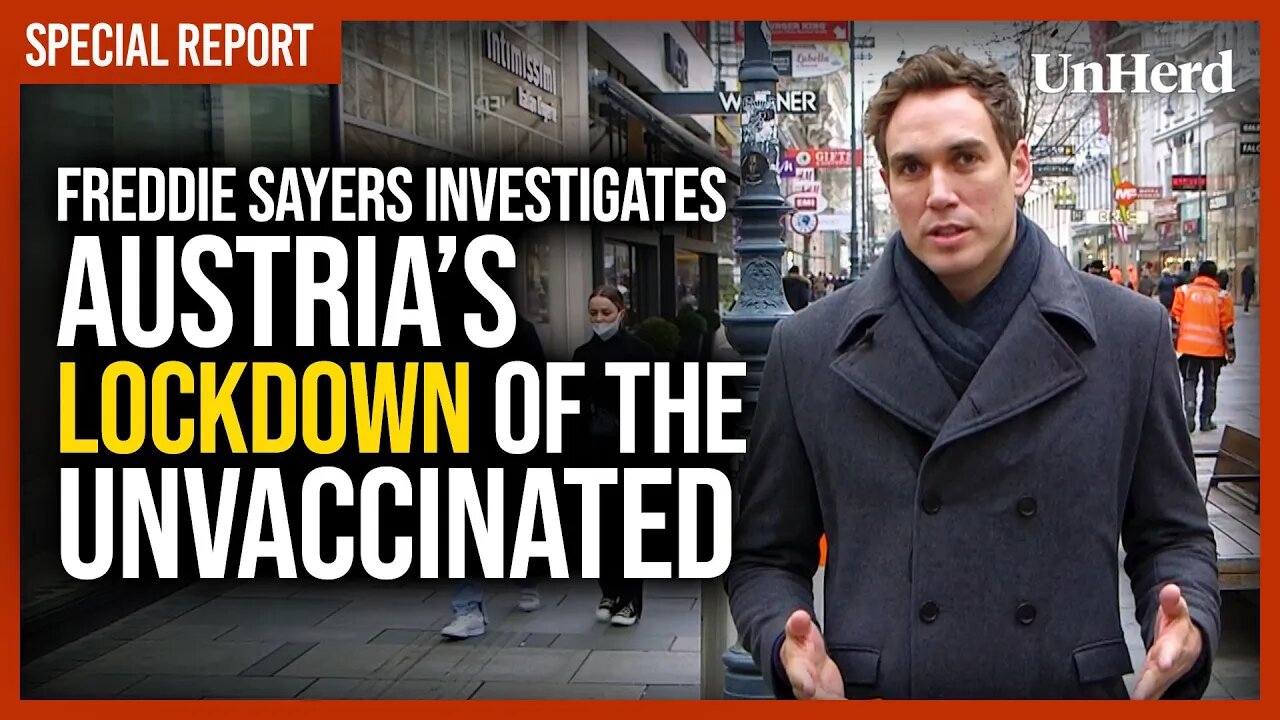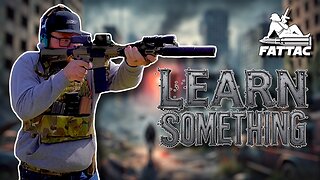Premium Only Content

Inside the Austrian Lockdown
Inside the Austrian Lockdown
Nov. 17, 2021
We Explore The World's First Lockdown For The Unvaccinated
Mia and Christopher are Austrian circus performers. From their home in Vienna, accompanied by their dog, Magic, they go off to take part in theatrical shows large and small around Europe, from the Royal Albert Hall to private parties, sometimes juggling fire, sometimes trapeze, sometimes simply with stunning displays of balance and strength.
Perhaps the least interesting thing about this talented young couple is that they are unvaccinated against Covid-19. When I meet them at their house in a wooded suburb outside Vienna, I am almost embarrassed to ask about it. But they carefully explain how, for reasons of mistrust, caution and, as they see it, integrity, they have decided not to take the Covid vaccine — and how this fact is suddenly defining their whole lives.
Since Monday, unvaccinated Austrians are not allowed to leave their homes except to go to work, to buy essential supplies, or to take exercise: it's the world's first "lockdown for the unvaccinated". It was introduced in response to rapidly rising cases and a lack of excess capacity in Austrian hospitals. "It is not a recommendation, but an order," announced the Interior Minister Karl Nehammer at a press conference. "Every citizen should know that they will be checked by the police."
It is, essentially, a ratcheting up of the regime of vaccine passports that exists already in many countries across Europe, whereby unvaccinated people are already excluded from restaurants, museums and theatres. But to place a minority of the population under partial house arrest does seem to cross a new line.
The Brazilian-born Mia has already had Covid and, in the Austrian "2G" system, proof of recovery affords you the same status as if you had been vaccinated — albeit for a period of six months. So, for now at least, she is allowed out and about. Chris is stuck at home. He describes it as a "brainfuck". Attempting to remain philosophical about it, he explains how he tries to tune out the relentless fear coming out of the TV and keep control of his own mental state. "I don't want to be dependent on these kind of things to be happy." But the sense of alienation and unease is palpable. What will the future look like? He is supposed to be performing in Paris before Christmas; who knows if he will get there.
Back in the old town, alongside the fancy boutiques of the Kärntner Straße, it's a very different world. Affluent shoppers are out and about in the crisp November air, and they are more than happy to share their views with us.
"I think it comes much too late," says one woman. "They're crazy. All the trouble we have is due to those people that believe in, I don't know, that the earth is flat… If the majority of society depends on idiots, then they can't be helped and it's the end of society!"
Her view is typical — there is very little sympathy here, and a good deal of frustration. Only a few voices take the opposing view, and they tend to be passers-through more than the wealthy locals; the doormen and deliverymen we try to talk to just shake their heads. One man simply describes the latest lockdown as "bullshit."
What is striking is that very few think the policy will actually work. Covid levels per capita have shot up in recent weeks, and Austria now has one of the highest case rates in Europe. The rationale behind the lockdown is that it will increase the level of vaccination (low for a Western European country at 65%); but even supporters of the move predict that it will be followed up by more universal measures soon enough. The Austrian Chancellor Alexander Schallenberg openly explains that the policy is a heavy-handed "nudge": "My aim is very clear: to get the unvaccinated to get vaccinated, not to lock up the unvaccinated," he told ORF radio station.
On a practical level, though, the logic of the new rules does not withstand much scrutiny: unvaccinated workers are permitted to travel to and from work, and they work disproportionately within the hospitality sector. This means that they are currently allowed into restaurants and bars to serve, but not to consume. In any case, if there were only vaccinated people in a venue, that wouldn't necessarily make it Covid-free. Many places require daily testing for non-vaccinated staff, yet not for the vaccinated, leading to the odd situation where the unvaccinated are "safer" than the patrons.
It feels like a bit of a stand-off. The vaccine issue has become a show of strength, a test of principles. As Ivan Krastev, a political scientist at Vienna's Institute for Human Sciences, tells me: "When some of the anti-vaccine people said, `we are ready to defend our freedoms', the basic message of the Government was, `Okay, let's see what price you are ready to pay for them.' The idea of this measure is to make people uncomfortable."
One peculiar feature of this dramatic new measure is the silence of the liberals. Why are the bien-pensant Viennese, usually so concerned with the rights of minorities, so relaxed about a measure that in other contexts would seem outrageously draconian?
Somersaults of logic have been performed to assert that the policy is more liberal than the alternatives. For one thing, they say, it stops short of an actual vaccine mandate, which just about keeps alive the notion of personal choice; for the majority, it offers the hope of avoiding another lockdown, so seems to them to be a lesser intervention. And, unlike in neighbouring Italy, the unvaccinated can still work, with tests being provided at public expense. In Austria, across the West, there is no one left to assert the rights, or even try to understand the motivations of this despised minority, the anti-vaxxers. They are the new deplorables.
To interrogate this seeming contradiction, I visit Professor Manfred Nowak, one of Europe's pre-eminent human rights lawyers, at the University of Applied Arts in Vienna. He has dedicated his whole life to the upholding of human rights and the defence of oppressed minorities against arbitrary detention and mistreatment. Former Special Rapporteur to the UN on Torture, current Secretary-General of the European Campus of Human Rights, activist against Guantanamo Bay, UN Independent Expert on Children Deprived of Liberty — the list continues. I expect him to be a little concerned about the potential direction of travel in his home country of Austria.
He wasn't. He thinks the policy doesn't go far enough. "From a human rights perspective, you always have to balance the obligation to protect the right to life, the right to health, with interfering with other rights such as personal liberty," he tells me.
He wants to make vaccination mandatory, with refusal equivalent to a traffic offence, resulting in a fine rather than a criminal record. He is also worried about how this partial lockdown might affect an already divided society — but he is unconcerned about the human rights or civil liberties implications. Do you not even have a twinge of anxiety about the shift in democratic norms, or whether such discriminatory policy might be applied in different settings, I ask? "No, not really," he says, with admirable candour.
The final component in this lockdown mix is, of course, politics. In most European countries there are no mainstream political parties that could be described as "anti-vaccine", but Austria has the populist, right-wing Freedom Party, which was part of the coalition government until 2019; it has made vaccination choice a central issue. The FPÖ organises regular rallies in cities around Austria, and its new leader Herbert Kickl is gaining popularity by condemning Covid policies as "corona fascism".
Having thus turned vaccine hesitancy into a "right-wing" political campaign, Kickl has managed to put a face to the dissenting minority — and it's not one that many people like. As a result, instead of thinking of the unvaccinated as a vulnerable, if misguided, group and one worthy of protection and respect, they have become viewed as an extreme political enemy who must be defeated.
It would be hard to think of anyone less threatening or extreme than Mia and Chris. Alternative, certainly; anti-establishment, yes. But good people who in any healthy, confident culture would be cherished and celebrated. Allowing them, and millions like them, to drift into a caste of untouchables, separated from the mainstream, all for the sake of a marginal gain against a virus that is rapidly becoming endemic, may prove to be a grave miscalculation with effects that will be felt for years to come.
-
 54:05
54:05
TheGetCanceledPodcast
14 hours ago $12.36 earnedThe GCP Ep.11 | Smack White Talks Smack DVD Vs WorldStar, Battle Rap, Universal Hood Pass & More...
107K19 -
 13:37
13:37
Exploring With Nug
17 hours ago $7.11 earnedSUV Found Underwater Searching For Missing Man Jerry Wilkins!
71.6K4 -
 2:58:21
2:58:21
xBuRnTx
12 hours ago1st Warzone Stream Online
53.5K2 -
 6:10:21
6:10:21
JdaDelete
1 day ago $15.67 earnedDino Crisis - Sega Saturday
122K5 -
 23:22
23:22
MYLUNCHBREAK CHANNEL PAGE
1 day agoUnder The Necropolis - Pt 5
101K52 -
 2:26:11
2:26:11
Jewels Jones Live ®
2 days agoWINNING BIGLY | A Political Rendezvous - Ep. 108
157K46 -
 2:04:49
2:04:49
Bare Knuckle Fighting Championship
4 days agoBKFC FIGHT NIGHT MOHEGAN SUN FREE FIGHTS
82.5K7 -
 25:09
25:09
BlackDiamondGunsandGear
15 hours agoYou NEED to be Training For Whats to Come
56.6K11 -
 20:03
20:03
Sideserf Cake Studio
21 hours ago $1.94 earnedA HUNGRY HUNGRY HIPPOS CAKE THAT ACTUALLY WORKS?
52.1K14 -
 23:51
23:51
marcushouse
22 hours ago $1.80 earnedStarship’s Next Move Is Coming Sooner Than You Think!
38.5K7